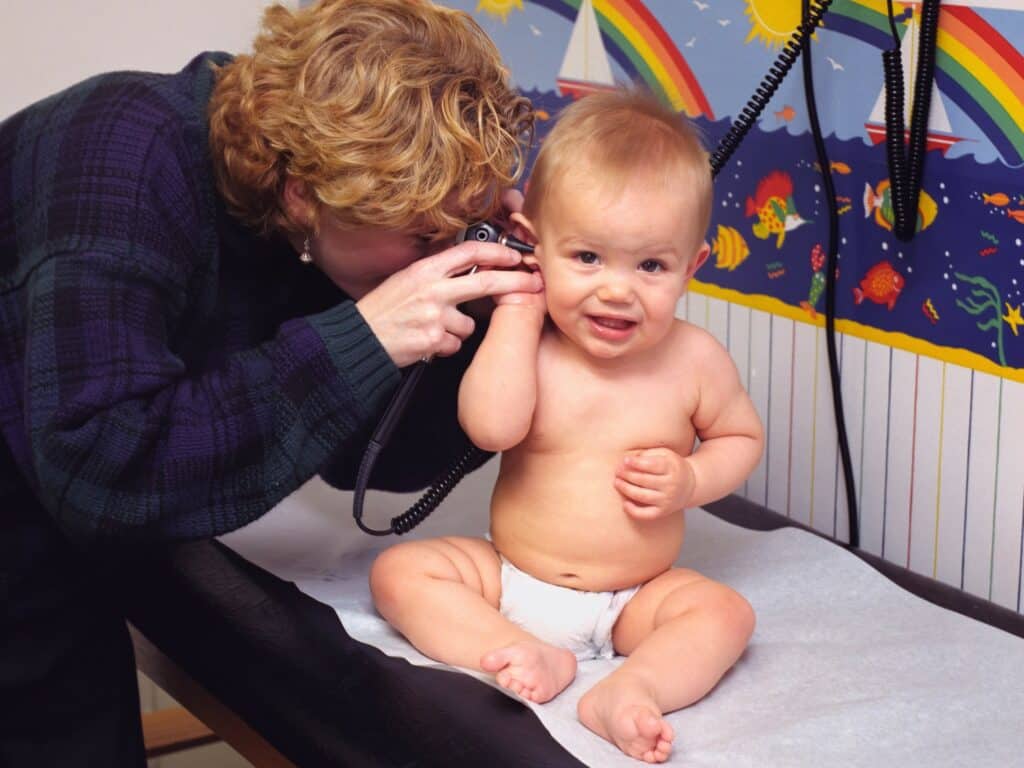Babies are known for their sweet scent, but what happens when Baby’s Ears Smell Like Cheese? This unusual odor can be concerning for parents and caregivers, leading them to wonder what could be causing it and how to address the issue.
Understanding the Ear Anatomy To understand why a baby’s ears might smell like cheese, it’s important to have a basic understanding of the ear anatomy. The ear is made up of three parts: the outer ear, middle ear, and inner ear. Each part plays a crucial role in hearing and balance, but the outer ear is the part most visible to the naked eye and where earwax is produced.
The Role of Earwax Earwax, also known as cerumen, is a waxy substance produced by glands in the outer ear canal. It serves as a natural lubricant and helps protect the ear from dirt, dust, and other foreign objects. However, when earwax builds up or becomes impacted, it can lead to an unpleasant smell and even infection.
Understanding the Ear Anatomy
The human ear is a complex and intricate organ responsible for hearing and balance. It is divided into three main parts: the outer ear, middle ear, and inner ear. Each part plays a crucial role in the overall function of the ear.

Outer Ear
The outer ear is the visible part of the ear and includes the earlobe and the ear canal. The ear canal is a narrow, tube-like structure that is lined with hair and glands that produce earwax. The ear canal helps to funnel sound waves into the middle ear, where they are amplified and transmitted to the inner ear.
Middle Ear
The middle ear is located behind the eardrum and contains three small bones called the ossicles. These bones are the malleus, incus, and stapes. The ossicles amplify the sound waves that enter the ear and transmit them to the inner ear. The middle ear is also connected to the Eustachian tube, which helps to equalize the pressure between the middle ear and the outside environment.
Inner Ear
The inner ear is the most complex part of the ear and is responsible for converting sound waves into electrical signals that are sent to the brain. It is also responsible for balance and spatial orientation. The inner ear contains the cochlea, a spiral-shaped structure filled with fluid and tiny hair cells that convert sound waves into electrical signals. The inner ear also contains the vestibular system, which helps to maintain balance and spatial orientation.
Eardrum
The eardrum, also known as the tympanic membrane, is a thin, cone-shaped membrane that separates the outer ear from the middle ear. It vibrates in response to sound waves and transmits these vibrations to the ossicles in the middle ear.
In conclusion, understanding the anatomy of the ear is important for understanding how it functions and how to properly care for it. Each part of the ear plays a crucial role in the overall function of the ear, and any damage or infection can affect hearing and balance.
The Role of Earwax
Earwax, also known as cerumen, is a natural substance produced by the body to protect the ear canal and eardrum. It is a mixture of dead skin cells, hair, and secretions from the sebaceous and ceruminous glands. Earwax is a normal and healthy part of the ear, and its presence helps to keep the ear clean and lubricated.
One of the main functions of earwax is to trap dirt, dust, and other particles that may enter the ear canal. This helps to prevent these particles from reaching the eardrum, where they could cause damage or infection. Earwax also has antibacterial properties that help to protect the ear from infection.
However, when too much earwax accumulates in the ear canal, it can cause problems. Wax buildup can cause hearing loss, ear pain, and tinnitus (ringing in the ears). It can also make it difficult for doctors to examine the ear and diagnose any underlying conditions.
To prevent wax buildup, it is important to avoid inserting objects such as cotton swabs or hairpins into the ear canal. These objects can push wax deeper into the ear and cause further problems. Instead, it is recommended to clean the outer ear with a washcloth or tissue.
In some cases, a doctor may need to remove excess earwax using special tools or ear drops. However, it is important to consult a doctor before attempting to remove earwax at home, as improper removal can cause further damage to the ear.
Common Causes of Smelly Ears in Babies
Smelly ears in babies can be a common issue that parents face. The smell can be unpleasant and concerning, but it is usually not a serious problem. The following are some common causes of smelly ears in babies:

Bacteria
Bacteria are one of the most common causes of smelly ears in babies. The ear canal is warm and moist, which creates an ideal environment for bacteria to grow. When bacteria multiply, they can produce a foul odor. Cleaning the ears regularly can help prevent the buildup of bacteria.
Infection
Ear infections can also cause smelly ears in babies. Middle ear infections are more common in babies than swimmer’s ear. The infection can cause fluid to build up in the ear, which can lead to a foul odor. If a baby has an ear infection, they may also experience ear pain, fever, and irritability.
Yeast Infections
Yeast infections can also cause smelly ears in babies. Yeast thrives in warm, moist environments, which makes the ear canal a perfect breeding ground. A yeast infection can cause redness, itching, and discharge, in addition to a foul odor.
Seborrheic Dermatitis
Seborrheic dermatitis is a skin condition that can affect the scalp, face, and ears. It can cause red, scaly patches on the skin, which can produce a foul odor. Seborrheic dermatitis is not serious, but it can be uncomfortable for babies.
Milk Spills
Milk spills can also cause smelly ears in babies. Milk can get trapped in the ear canal, which can lead to a foul odor. It is essential to clean the ears after feeding to prevent milk spills from causing smelly ears.
Residue
Residue from hair products or ear drops can also cause smelly ears in babies. The residue can build up in the ear canal, which can lead to a foul odor. It is important to clean the ears regularly and avoid using products that can leave residue.
In conclusion, smelly ears in babies can be a common issue that parents face. However, it is usually not a serious problem. Cleaning the ears regularly and identifying the cause of the odor can help prevent smelly ears in babies.
Symptoms of Ear Infections
Ear infections in babies can be difficult to detect as they may not be able to communicate their discomfort. However, there are some common symptoms that parents should look out for. Here are some of the symptoms of ear infections in babies:

- Fever: An ear infection can cause a fever in babies. A fever is usually a sign that the body is trying to fight off an infection.
- Discharge: If there is a discharge from the ear, it may be a sign of an ear infection. The discharge can be pus-like or clear.
- Pain: Ear infections can cause pain in babies. They may cry more than usual and tug at their ears.
- Foul odor: A foul odor coming from the ear can be a sign of an ear infection.
- Redness: The ear may be red and inflamed if there is an infection.
- Loss of appetite: Babies with ear infections may not want to eat as much as usual.
- Headache: Older babies may complain of a headache if they have an ear infection.
- Vomiting: In some cases, an ear infection can cause vomiting.
If a baby is displaying any of these symptoms, it is important to take them to a doctor. The doctor will be able to diagnose an ear infection and prescribe the appropriate treatment.
Effects of Ear Infections
Ear infections can have various effects on the health of a baby. In addition to causing discomfort, ear infections can also lead to several complications. Here are some of the effects of ear infections in babies:
Hearing Loss
Ear infections can lead to temporary or permanent hearing loss in babies. The inflammation and buildup of fluid in the ear can affect the ability of the ear to transmit sound waves to the brain. This can cause difficulty in hearing and understanding speech, especially in noisy environments.
Hearing Problems
Babies with ear infections may experience difficulty in hearing certain sounds or frequencies. This can affect their ability to learn and develop language skills. They may also have trouble hearing soft sounds or whispers.
Trouble Hearing
Ear infections can cause a feeling of fullness or pressure in the ear, making it difficult for babies to hear properly. They may also experience ringing in the ear or a sensation of buzzing or humming.
Loss of Balance
In some cases, ear infections can affect the balance of a baby. This is because the inner ear plays a crucial role in maintaining balance. When the ear is infected, it can disrupt the signals sent to the brain regarding balance, leading to dizziness or loss of balance.
Overall, it is important to seek medical attention if a baby shows signs of an ear infection. Early treatment can help prevent complications and reduce the risk of long-term effects on hearing and balance.
Hygiene and Care for Baby’s Ears
Maintaining good hygiene and care for a baby’s ears is crucial to prevent infections and unpleasant smells. Poor hygiene can lead to the accumulation of dirt, wax, and bacteria, which can cause irritation, itching, and foul odor.

To ensure proper hygiene, it is essential to clean the baby’s ears regularly. The following are some tips for cleaning a baby’s ears:
- Use warm water and a soft towel to clean the outer part of the ear. Avoid inserting the towel or any other object into the ear canal.
- If there is a buildup of wax, use a cotton swab to gently clean the outer part of the ear. Do not insert the swab into the ear canal as it can damage the eardrum.
- Apply a few drops of baby oil to the ear canal to soften the wax. This can make it easier to remove the wax during cleaning.
- If there is an infection or excessive wax buildup, consult a pediatrician. They may recommend the use of hydrogen peroxide or warm compresses to clean the ears.
It is important to note that excessive cleaning of the ears can also be harmful. Over-cleaning can lead to dryness, irritation, and an increased risk of infection. Therefore, it is recommended to clean the ears only when necessary and to avoid using any harsh chemicals or tools.
By following these simple tips, parents can ensure that their baby’s ears remain clean and healthy, reducing the risk of infections and unpleasant smells.
Prevention of Ear Infections
Preventing ear infections is the best way to avoid the unpleasant smell of cheese coming from your baby’s ears. Here are some tips to help prevent ear infections:
Keep ears clean and dry
Keeping your baby’s ears clean and dry is essential in preventing ear infections. Use a soft cloth or tissue to gently clean your baby’s ears after a bath or shower. Avoid using cotton swabs as they can push wax and debris deeper into the ear canal.
Avoid exposure to secondhand smoke
Exposure to secondhand smoke can increase the risk of ear infections. Try to keep your baby away from smokers and avoid smoking around them.
Breastfeed your baby
Breastfeeding can help prevent ear infections in babies. Breast milk contains antibodies that can help fight off infections.
Vaccinate your baby
Vaccinating your baby against common childhood illnesses can help prevent ear infections. Talk to your doctor about the recommended vaccines for your baby.
Avoid giving antibiotics unnecessarily
Antibiotics are only effective against bacterial infections, not viral infections. Avoid giving antibiotics unnecessarily as this can lead to antibiotic resistance.
Consider ear tubes
If your baby is prone to ear infections, your doctor may recommend ear tubes. Ear tubes are small tubes that are placed in the eardrum to help drain fluid and prevent infections.
Treat ear infections promptly
If your baby does develop an ear infection, it’s important to treat it promptly. Untreated ear infections can lead to more serious complications, such as hearing loss.
Use antibacterial products with caution
Using antibacterial products, such as hand sanitizers and wipes, can kill off both good and bad bacteria. This can lead to antibiotic resistance and may not be effective in preventing ear infections. Use these products with caution and only when necessary.
By following these tips, you can help prevent ear infections in your baby and avoid the unpleasant smell of cheese coming from their ears.
When to Consult a Pediatrician
If a baby’s ears smell like cheese, it may be a sign of an underlying medical condition. While it is not uncommon for a baby’s ears to have a slight odor, a strong cheese-like smell could indicate an infection or other issue. In such cases, it is important to consult a pediatrician.

A pediatrician is a medical doctor who specializes in the care of infants, children, and adolescents. They are trained to diagnose and treat a wide range of medical conditions that affect children, including ear infections. If a parent notices that their baby’s ears smell like cheese, they should make an appointment with their child’s pediatrician as soon as possible.
In some cases, a pediatrician may prescribe antibiotics to treat an ear infection. It is important to follow the doctor’s instructions carefully and complete the full course of medication, even if the symptoms improve before the medication is finished. Failure to do so can lead to a recurrence of the infection or the development of antibiotic-resistant bacteria.
In worst-case scenarios, a baby’s ears smelling like cheese could be a sign of a more serious medical condition, such as a tumor or cyst. If a pediatrician suspects that this may be the case, they may refer the baby to a specialist for further evaluation and treatment.
In conclusion, if a baby’s ears smell like cheese, it is important to consult a pediatrician. They can evaluate the baby’s symptoms and determine the underlying cause of the odor. With prompt and appropriate medical care, most cases can be successfully treated, and the baby can return to good health.
Unusual Smells and Rare Conditions
Babies can have a variety of smells, some of which can be unusual and even concerning to parents. While most of these smells are harmless and temporary, some can indicate rare conditions that require medical attention. Here are some of the unusual smells and rare conditions that parents should be aware of:
- Cheese-like smell: Some babies may have a cheese-like smell coming from their ears. This can be due to the accumulation of milk residue, sweat, or dead skin cells in the ear canal. It is usually not a cause for concern and can be easily treated by cleaning the ears with a gentle solution.
- Sweet smell: A sweet smell may indicate Maple Syrup Urine Disease (MSUD), a rare genetic disorder that affects the body’s ability to break down certain amino acids. If left untreated, MSUD can lead to neurological problems and even death. If a baby’s urine smells sweet, parents should consult a doctor immediately.
- Poop-like smell: A baby’s poop can have a strong odor, but if a baby’s breath smells like poop, it could be a sign of a serious condition called fecal impaction. Fecal impaction occurs when a large amount of dry, hard stool accumulates in the colon and rectum, causing a blockage. This condition requires medical attention.
- Fishy smell: A fishy smell coming from a baby’s skin or urine can be a sign of trimethylaminuria (TMAU), a rare metabolic disorder that affects the body’s ability to break down certain compounds found in fish, eggs, and other foods. TMAU can cause a strong fishy odor that can be socially isolating. There is no cure for TMAU, but it can be managed with dietary changes and medication.
- Sour milk smell: A sour milk smell coming from a baby’s skin or breath can be a sign of a rare condition called Isovaleric Acidemia (IVA), a genetic disorder that affects the body’s ability to break down certain amino acids. If left untreated, IVA can cause seizures, coma, and even death. If a baby’s breath or skin smells like sour milk, parents should consult a doctor immediately.
- Body odor: While it is normal for older children and adults to have body odor, it is unusual for babies to have a strong body odor. If a baby’s skin or breath smells strongly of body odor, it could be a sign of a rare metabolic disorder. Parents should consult a doctor if they notice a strong body odor coming from their baby.
In conclusion, while most of the unusual smells that babies can have are harmless, some can indicate rare conditions that require medical attention. Parents should be aware of these smells and consult a doctor if they are concerned.
Conclusion
In conclusion, while it is not uncommon for a baby’s ears to emit a cheesy odor, it is important to note that this does not necessarily indicate a serious health concern.
There are several potential causes for this smell, including the buildup of earwax, sweat, or even a small amount of milk that may have spilled into the ear canal during feeding. It is important to keep the baby’s ears clean and dry, but excessive cleaning can also lead to irritation and further complications.
If the smell persists or is accompanied by other symptoms such as redness, discharge, or fever, it is recommended to seek medical attention from a pediatrician.
Overall, while the smell of cheese in a baby’s ears may be concerning to some parents, it is important to remain calm and take appropriate measures to ensure the baby’s health and well-being.
Also, read: Newborn Ear Color Determine Skin Color
Frequently Asked Questions
What causes a baby’s ear to smell like cheese?
A baby’s ear can smell like cheese due to a buildup of wax, sweat, and oils. These substances can accumulate in the ear canal and create an environment that is conducive to bacterial growth. When bacteria thrive in the ear canal, they can produce a cheese-like odor.
What are some common reasons for smelly ears in babies?
In addition to wax, sweat, and oils, smelly ears in babies can also be caused by fungal infections, bacterial infections, or a foreign object in the ear canal. Poor hygiene can also contribute to smelly ears in babies.
How can I clean my baby’s ears to prevent odor?
To prevent odor in your baby’s ears, it is important to clean them regularly. You can do this by using a damp washcloth to gently wipe the outer ear. It is important not to insert anything into the ear canal, as this can cause damage and increase the risk of infection.
Is a cheese-like smell in a baby’s ear a sign of infection?
While a cheese-like smell in a baby’s ear can be a sign of bacterial growth, it is not necessarily an indication of infection. Other symptoms, such as redness, swelling, or discharge, may be present if an infection is present.
What are some other smells that may indicate an ear infection in a baby?
In addition to a cheese-like smell, other smells that may indicate an ear infection in a baby include a foul odor, a musty smell, or a sweet smell. It is important to seek medical attention if you suspect that your baby has an ear infection.
Should I be concerned if my baby’s ear smells sweet or like vinegar?
If your baby’s ear smells sweet or like vinegar, it may be a sign of an infection or a metabolic disorder. It is important to consult with a healthcare professional to determine the underlying cause of the smell and to receive appropriate treatment.

Iesha is a loving mother of 2 beautiful children. She’s an active parent who enjoys indoor and outdoor adventures with her family. Her mission is to share practical and realistic parenting advice to help the parenting community becoming stronger.
